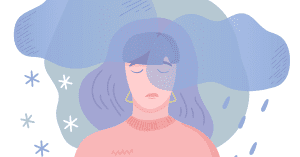Seasonal Affective Disorder in aged care
For some people the seasons have a greater impact that simply preferring one to the others. In fact, Seasonal Affective Disorder (SAD) means that the weather can have a notable effect on mood, mental health and even physical health.

For older individuals, including those who may already have health concerns, SAD can be challenging. It’s important for those who care for the elderly to have an understanding of the disorder so they know how to identify it and what options there are to support a person who is experiencing SAD.
Understanding Seasonal Affective Disorder (SAD)
Seasonal Affective Disorder or SAD is a mood disorder that is related to the changes in seasons. This means for those with SAD it is likely to begin and end at the same time each year. Most commonly, the disorder begins to show symptoms in autumn continuing into the winter months. However, it is also possible to experience the depressive effects of SAD in the warmer months too.
You may have heard people refer to the winter blues. This may or may not be related to Seasonal Affective Disorder, but don’t let the colloquial reference make it seem like SAD is something that anyone should have to endure. Even living in the warmest parts of Queensland, you can experience non-winter SAD and its impact. While cold weather and a lack of sunlight can have an effect, so too can heat and humidity. In addition, in summer knowing everyone is out and about or enjoying time with others can be a trigger for a feeling of disconnection or isolation for those who don’t feel they have those connections.
There are a number of factors that contribute to the development of SAD, and many link back to extended periods with a lack of sunlight during the colder months or simply due to spending extended period of time indoors. Limited sun exposure can lead to:
Lack of Vitamin D
Vitamin D is essential for optimal functioning and many studies show the connection between adequate Vitamin D for preventing and treating mental health conditions, promoting bone health and better sleep. When an elderly person is not getting enough Vitamin D or have a Vitamin D deficiency, they risk developing muscle weakness, mental health problems, osteoporosis, tiredness, restless sleep and digestive complaints.
Reduced levels of serotonin
Reduced serotonin levels have been found to be directly related to symptoms of depression. Serotonin is the key hormone that affects brain function including mood stabilisation and the feeling of being happy. It also impacts sleeping, eating and digestion. Vitamin D is involved in the activation of the neurotransmitters that ensure we get enough serotonin to keep us happy and healthy.
Impacted circadian rhythms
Rest is vital for bodies at every age to function to the best of their ability. During sleep we restore our energy levels and heal physically and cognitively. Without enough sunlight circadian rhythms or sleep patterns can be disturbed leading to a lack of sleep and in turn reduced immune efficiency, ability to heal and mood changes.
Identifying the symptoms
Aged care workers should be aware that many of the symptoms of SAD are similar to those of depression. If you’re noticing any of the following in the elderly people you care for, it is possible they are experience Seasonal Affective Disorder, or other forms of depression, and may need support or mental health assessment and treatment.
Symptoms of SAD in the elderly may include:
- Feeling sad
- Reduced energy levels
- Lack of interest in activities they previously enjoyed
- Sleep troubles (interrupted, oversleeping or insomnia)
- Appetite or weight changes
- Irritability
- Difficulty concentrating
- Withdrawal
The impact of SAD on older individuals
Seasonal Affective Disorder can occur for people at various ages, including those later in life.
Many elderly individuals are already living with depression, anxiety and other mental health issues, as well as other illnesses or conditions. The symptoms of a number of these can be exacerbated by Seasonal Affective Disorder.
For a number of reasons, elderly people may be less likely to spend time in the sun. This could be due to mobility difficulties, lack of support or existing symptoms of depression, to name a few.
Supporting those with Seasonal Affective Disorder
As an aged care worker you can be a key support person for elderly people. Staying aware of how older individuals are feeling and taking action as needed is a must to ensure people living in aged care can get the support they may need.
If you notice the symptoms of Seasonal Affective Disorder, or other types of depression, in those you provide care for, help them to access appropriate care. This may be reaching out to doctor or mental health professional.
Treatment options might include light therapy, which involves the use of a light box to provide artificial sunlight. There are also medications and talk therapies to support those with SAD, or a combination of treatments might be necessary.
Help is available to improve mental health in aged care
As an aged care worker, supporting the mental and physical health of the elderly is crucial. There are many resources you can recommend and/or support ageing individuals to access for help. We have compiled some useful wellbeing resources here for those in aged care to recommend and use so you can do your part in enhancing quality of life in aged care settings.
Contact the team at Royal College for more information on how to start your career in aged care.



